Thanks for encouragement and contributions to everyone who has posted to this thread. I appreciate them all

Now then, down to business...

 Bagheera wrote:Xard:
Bagheera wrote:Xard: You fucker, you're such a tease.

and a lazy one too, I had too much fun with other topics the whole day...then I finished the translation but I still haven't posted it because I want to put it up same time with this post and damn didn't this bloat into a monster while writing

So, I think Kestrel and Bagheera raise essentially same points about many things. As quick reply to Kestrel about Shinji not being broken enough etc. see my earlier long reply to Bagheera. It's not that important for relevant similarities between Shinji triggering Third Impacts in both works nor am I denying the likely possibility what looms in future in form of "Final Impact". The parts of 3I for which such considerations matter are not what I need to establish the "post-EoE" frame in the sense I mean it.
What I need for my case on Shinji's "post-EoE" character arc and what 2.0 provides is him being responsible for Third Impact. Baghs:
Okay, basically our difference over whether or not Shinji's arc has deviated comes down to - again just like with 3Is - question of focus.
You're probably correctly treating Rebuild's storyline so far (incl. 3.0) as way to drive Shinji to that catatonic breaking point we find him in EoE. The story elements are evaluated in how they contribute to this great breaking down process so you can say Eva and Shinji's arc are the same and they'll culminate in similar mindfuck Impact as in EoTV/EoE (in this sense).
To that I say: sure, fine, absolutely. Now thanks to ubiquitous weirdness of Rebuild's story elements further and further it has gone I'm not
100% certain we end up with catatonic Shinji going through EoEsque Instrumentality Project to reach enlightenment and all bla bla but chances are we're getting something like that. Why? Because if Rebuild keeps exactly same main themes and main conflict in similar form it can't help but do this. There's no other natural way for story to culminate and to deliver the message. It's like SDFM and DYRL resolving Space War I in same manner despite vast story, characterization and design differences: it's resolution that has been predicated from show's very premises and as long as those premises stay same so will the resolution. But this doesn't mean the characters and storyline don't end up travelling very different, distinct roads sans these few essentials.
To put it simply you're focusing on
where the drama gets Shinji in 3.0 after the process is done. What I'm focusing on and care about are the process itself and themes and issues contained within the process. This is where 3.0 and Descend Arc of NGE are nigh-completely different and don't share thematically much if any common ground at all. Indeed, Shinji's main theme/issue and way it is handled is something that can only be realized in "post-EoE" narrative mindset which in practice means post-3I Shinji is responsible for.
But before it becomes apparent what is so different and new about 3.0's Shinji I must first establish NGE's Descend and its main thrust.
(note: I'm Descend Arc to refer to 20-24 as descend towards EoE instead of the old Commentary Project usage where it refers to 14-19)
In other words here's
Part 2 on post-EoEness of 3.0
3.0 as post-EoE fiction: Shinji can (not) atone
Freewheeling existential tumbling down tumbling down tumbling doo'oown: Descend Arc and characters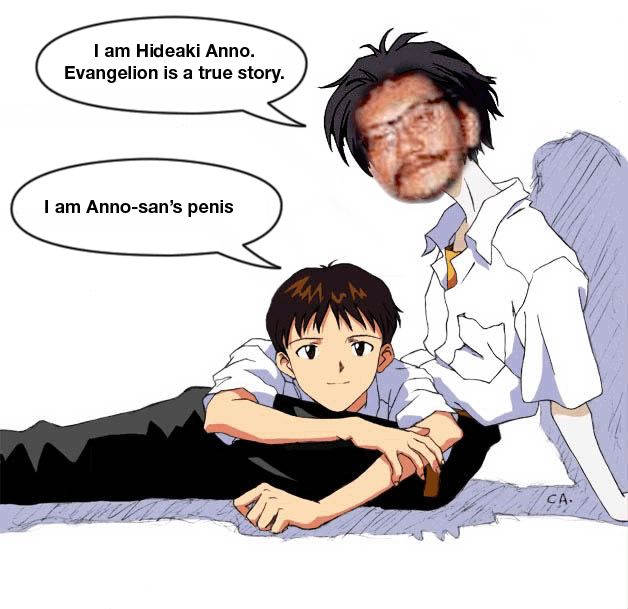
(As we're on Eva forum I'm assuming some "common information" as given so I don't need to go trawling the internet for obscure Anno interviews.)
Among the general shifts in focus Evangelion goes through its torturous television run one of the most large scale and influential ones was Anno's shift from building satisfactory, reasonably easy to grasp SF story with "unworthy" (of being) main heroes that would feature musings on nature of evolution, God and whatnot into alien and arguably more hopelessly overambitious territory. The psychological, soul searching element was there from start but what Anno was initially foremost concerned with was creating a work that would surpass even Space Battleship Yamato and Mobile Suit Gundam and become otaku anime so great it would convert all of Japan into anime fans and end their seclusion that way.
Obviously Anno abandoned that plan halfway through and instead NGE started delightfully schizophrenic attack on otaku fiction and thus on itself too. But even more than that Anno lost whatever interest he might've had for the story in itself and Evangelion became a full blown study of human psyche in general and his issues and a try to answer the latter. The SF storyline became even more of a window dressing next to existential searching and struggle the characters and by extension Anno went through. Man himself summed this up in as clear term as possible in Newtype 1996-11 issue:
Hideaki Anno wrote:I didn’t have any interest in studying human psychology in the past. I only took a course about it at university, but I suppose I always had something in my mind to analyze human psyche. I thought I wasn’t interested in humans very much, but then, when I started talking about myself, I needed words to explain. So, I started reading books on psychology. From Episode #16, EVANGELION’s story went into the direction to ask just what the human mind is all about inside. I wrote about myself.
Now this doesn't mean the story - even if it became just a excuse for Anno's explorations - became incoherent or dissipated away entirely like in ideal SoL, of course. Eva isn't the plot hole ridden mess it often gets called and funnily enough the density of narrative reaches its culmination point in Descend Arc. The skill with which Anno covers enormous amounts of backstory and events in likes of ep 21 and ep 23 is astonishing and has been deservedly praised over years. But the characters etc. aren't really
going anywhere: they're all avenues through which Anno approaches and discusses his understanding of human nature. Shinji is his main avenue, of course, but he is far from the only one and in truth by end of EoE Anno has used the whole cast from main characters to minor ones like bridge bunnies and Fuyutsuki to add to the "grand statement" they together form.
Most clearly this "SF story derailment for author introspection" can be seen from how Angel battles gradually morph from Kaiju opponent of the week fights into excuses for probing the minds of the pilots and their issues. In a sense in Eva's late stages that characters aren't "developed" much: rathey they're broken to pieces and what makes them tick becomes focus of exploration. One can see this clearly done in succession to Shinji, Misato, Asuka and Rei over 20-21-22-23. In fact 20-21 does the same for Kaji (and thus he can be offed from the story in end of 21) and 21 also starts probing major NERV figures like Gendo and Fuyutsuki. In particular Fuyutski gets many implications about his "failures" as a human being in ep 21. Exploration of Ritsuko is mainly confined to ep 23 (like exploration of Kaji is to 20-21) after some crucial backstory and info is given in ep 21.
All in all what is important is this:
While character study from beginning it's in later half and especially in Descen Arc Eva's story becomes essentially nothing more than excuse and backdrop for Anno's philosophical pondering and attempts to analyze human psyche. This is achieved through using the whole cast to approach same key issues (failure to communicate, hedhehog's dilemma, escapism etc.) from multiple perspectives
Descend Shinji and his "arc"
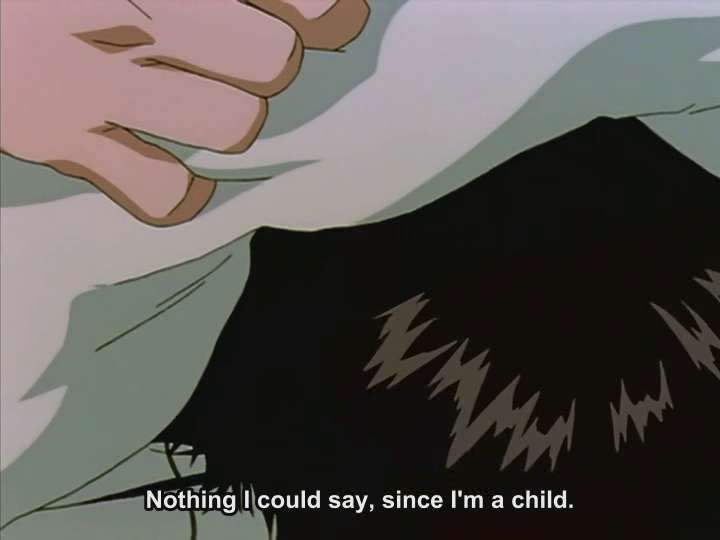 Shinji the suffering spectator
Shinji the suffering spectatorBecause of transformation the show and characters go through in its second cour in general and esp. in Descend arc what I'm about to write on Shiji probably isn't too surprising.
Generally speaking Shinji is a passive receptor and "victim" of the story that is focusing on others. He doesn't have much of a impact on it nor does he have much of a "arc" or development as a person. He can't help but watch helplessly as things get worse and worse around him as everyone else keeps breaking further down. He cares and wants to fight for Asuka and Rei in episodes 22 and 23 respectively. He's completely powerless on both instances. He wants to support Misato who just utterly breaks down after Kaji's death but again, lacks the power and means to support adult in this situation and after her "come on" in ep 23 Shinji starts to shun her.
It's only in ep 24 Shinji becomes the focus again (first time since ep 20) and gets finally broken as the answer, pure love and acceptance Shinji wishes for (provided by Kaworu) turns out to be "fake" and unsustainable in reality. This crushing disappointment together with his isolation eventually leads him to reject reality that doesn't provide for him what he needs even with its "best shot" (Kaworu) and leads to all the happy hijinks that go down in EoE.
You can draw a clear character arc all the way from the beginning of series to episode 19. I don't think it's coincidental in the least that after catastrophical failure of reaching key milestone in "protagonist progress chart" his role as active, shonen protagonist falls apart too and he becomes a siphon of introspective despair and a "spectator" who only gains answers to questions that have essentially become what
defines his character
(as opposed to actions or aims beyond resolving his now constant inner turmoil eg. gaining Gendo's acceptance) only at the very end of series: EoTV/EoE.
I'd say key milestones in Shinji's genuinely developing character arc as shonen protagonist in first half of series culminate in ep 12 that doubles as cour one's climax (ep 13 is the "odd one out there" episode of the series that doesn't fit organically into first or second cour either). At this point Shinji has found a place and something resembling companionship in the world, he's more resolved to take on reality instead of running away and as icing on the cake he has finally gained introspective understanding of himself and what he wants (Gendo's love and acceptance - despite his ambivalent feelings explored in ep 16).
The next major step in Shinji's life (and it's the point when things start to go horribly wrong for him) would be Bardiel incident of episodes 17-18. They crush whatever hopes of reconciliation with his dad he might've mustered (especially after episode 15) and essentially undo the driving purpose he's had up to this point. All this time Shinji has wanted his father's acceptance and in the meantime he has gained somewhat decent life (sans Angel fighting part) in the "reality" of Tokyo-3.
Now it's all over - it was a unsatisfactory sham that brings pain in the end, Gendo is unredeemable to boot - and he wants to have nothing to do with piloting Eva again, even if that was the way he found a bond with others (like Rei).
This is the classic part in hero's journey when hero "refuses" the call and hits the slump point before raising again to do his bidding and the good deed.
Thus we get episode 19 that plays this well worn
(for a good reason because it's great stuff like all classic conventions, if they're unsatisfactory that's because execution is lacking - there's no problem with convention itself :P) trope in straightforward fashion nearly through the whole episode. This is Shinji's "rebirth" as hero in sense so ep 1 parallels know their place.
Now Shinji wants no answers or approval from his father nor is he hesitating to face the danger: he's here to do his duty as eva pilot and what decent human being in his position ought to do. Congratulations Shinji, you're on brink of "manhood" now.
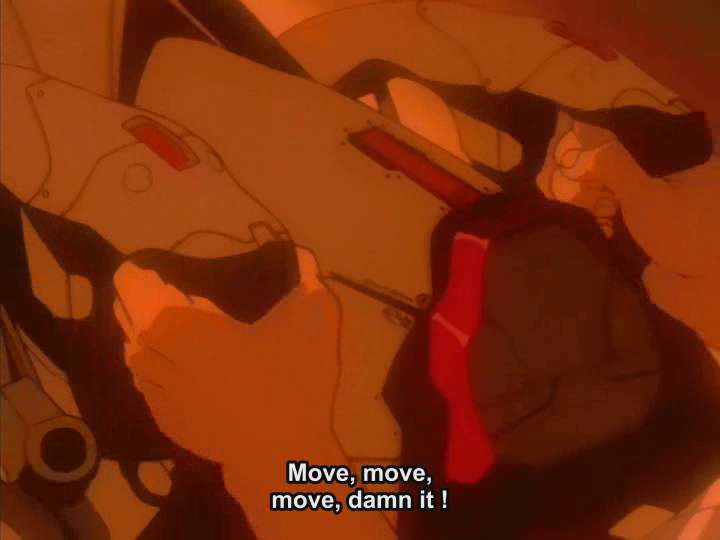 WHOOOOOOOOPS
WHOOOOOOOOPSThe great crash happens and instead of independently taking steps towards maturity Shinji is involuntarily caught in freak accident, loses cohesive image of himself and ends up back in his mother's symbolic womb where he needs to piece together his "self" again.
Ep 20 really opens the door gates into Shinji's descend into utter existential confusion as all the questions and issues he has had alternatively on the back on his mind (occasional puzzlement at why they're fighting Angels anyway) and on surface (like in ep 16 Leliel "interrogation") take over his internal life to a point he's not "freed" - or rather he realizes certain things he can never be rid off and life is a cycle - from them before EoTV and EoE.
This psychological strayness together with his powerlessness to change anything (help Asuka/Rei/Misato, *not* having to kill Kaworu etc.) is what defines Shinji's character. What we see in Descend Arc is a passive Shinji trying to desperately cling to what he has untill the series of escalating losses pushes him over the edge after he's forced to kill Kaworu.
Before that point there's little for Shinji to feel guilty about either. Say whatever you will about Shinji but before EoE's mass extinction his choices haven't had much of a impact on population at large. No one holds him responsible for destruction wrought by berserk Eva-01 in eps 2 and ep 19 for example, naturally enough, because he's not directly responsible for either incident.
Summary:
After ep 19 Shinji undergoes very little "development" as character, indeed he loses nearly all goal-directness that defines main character in general. Descend Shinji is like blank of wood traveling downstream filled with anxiety and inability to affect where he and the story is going - he doesn't even have any particular direction he wants to direct the events either beyond trying to keep what he hasn't yet lost. He's (affected) spectator. Next time when he gains genuine influence on course of events would be in EoE when he actually gets to decide fate of the world by either accepting or rejecting Instrumentality. NME: Do You Remember SF?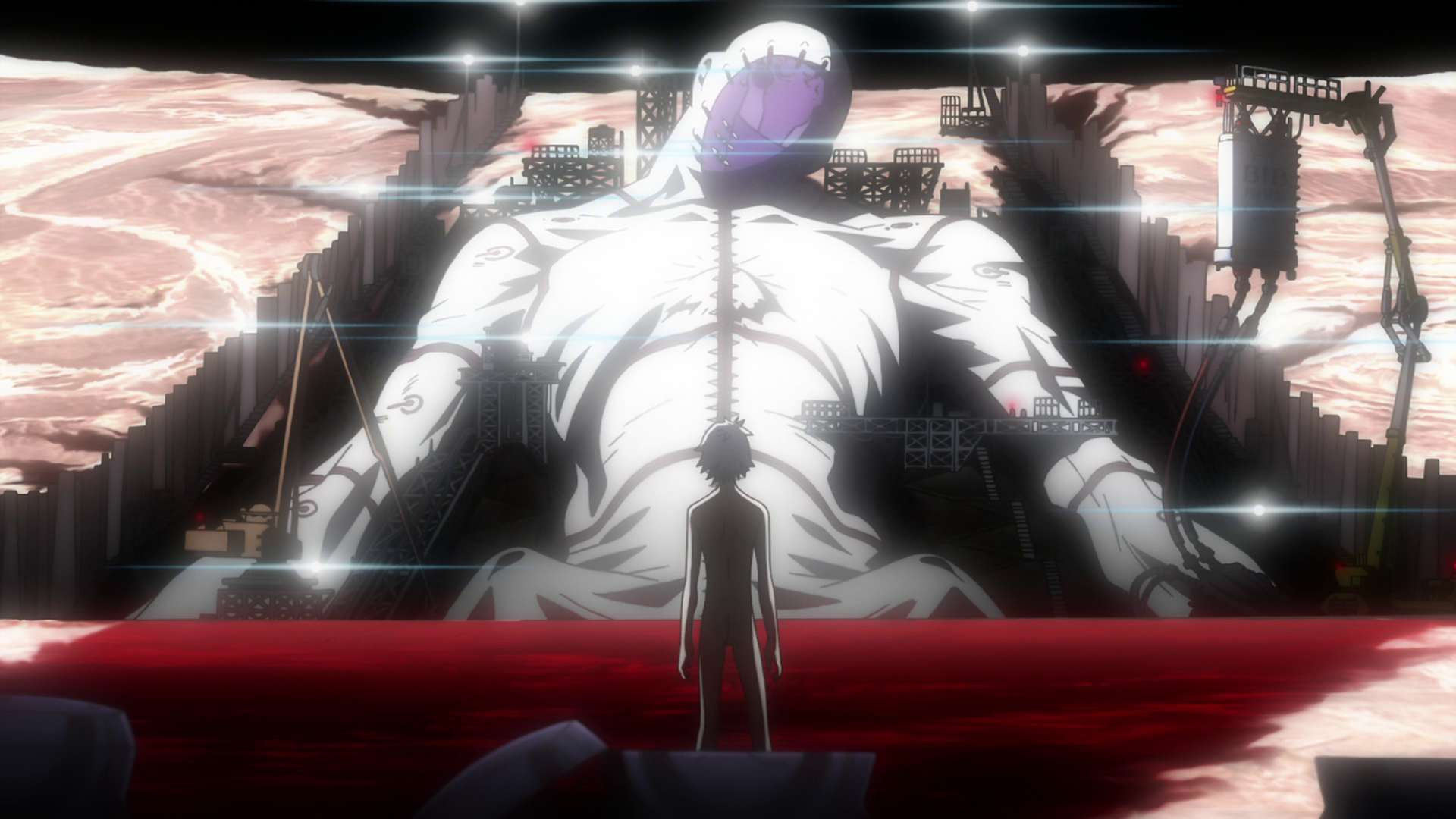 *plays Also Sprach Zarathustra*So, what are the main differences between NGE and Rebuild overall as narratives? Are there meaningful differences on very general level? If so are these differences and differences in Shinji's characterization in some sort of co-dependant relationship?
*plays Also Sprach Zarathustra*So, what are the main differences between NGE and Rebuild overall as narratives? Are there meaningful differences on very general level? If so are these differences and differences in Shinji's characterization in some sort of co-dependant relationship?I'd venture forth and say yes to all these questions. With last point I don't mean the trivial observation that changes in Shinji's characterization affects the narrative even in the most superficial cases because said characterization is part of the narrative to begin with. What I'm saying is that change in focus in Shinji's development is natural outgrowth of change of the narrative in general - and vice versa.
First of all
NME is unified and consistent in approach. This may on glance seem pretty gaspable claim given what we know about the writing process of the films and the wild leaps 3.0 makes storywise. Regardless it's true and has no real connection with semi-improvising, "organic" way to develop story along the way Anno seem to have learned from Miyazaki. No matter how much details of story have been changed and how much more ambitious the project has grown from its start NME adopted approach to narrative that has stayed the same. This is to say
Anno and co. are consciously crafting new take on Evangelion as story.
There's no psychological breakdown, production breakdown and all the surrounding baggage this time around "weighting down" the anime as entity separate from the creators (no matter how personal many of the things still are to Anno in particular). Original Eva was like a organ that started developing normally but developed mutation that "ate" the organ itself. While NGE holds together astonishingly well as singular whole in terms of approach the post-ep 16 series ate and deformed what came before almost beyond point of recognition. It's like building which architect decided to build as functionalist building first but halfway through decided he wants to do rococo villa instead and instead of dismantling and starting over from beginning starts to build the new sections on top of already built. This is the degree of difference in focus and intent that follows when science fiction story (with admittedly heavy character and thematic focus on same elements) decides to change focus to intense study of authors own psyche - which sounds more like one man and a chair avant-garde theatre. (Incidentally that's what EoTV oft. reminds me of.) SF elements were not abandoned per se - author was scifi otaku after all and as such all the "otakuness" was legitimate part of his psychological makeup too - but became dispensable window dressing which were done away with in EoTV. This just goes to show how far Anno had strayed from creating a scifi epic to surpass Yamato and Gundam in his aims and mindset.
Rebuild has not done similar focus gambit nor does it even try to become radical, metafictional self-therapy session for otakudom. It aims for similar ends and shares identical themes but goes at it in more traditional, controlled fashion fitting blockbuster film tetralogy. This brings me to:
NME is reimaging of Neon Genesis Evangelion as a story first, character study second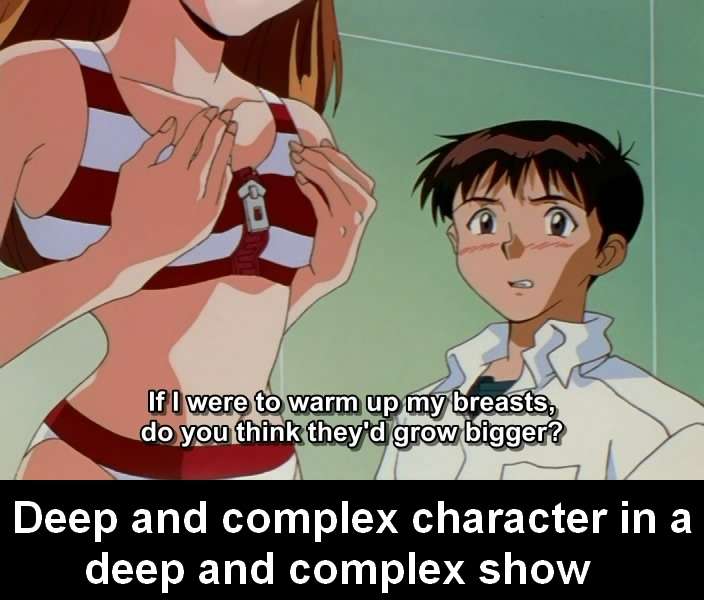
All this time I've been slightly humoured by most complaints about "shallowness" of NME's cast for four reasons. For
one it isn't really fair in most cases as Rebuild has paid attention to not let old major cast members regress into one-dimensionality within the running time limits imposed by format (indeed the usual complaint about eg. Asuka's character development in 2.0 is that it is
rushed, not that it doesn't exist - if Asuka was somehow notoriously shallow this time around there'd be nothing to rush in the first place!).
Secondly many characters have undergone more
development (as opposed to exploration) than their NGE counterparts as is. Rei is probably the most notable example: say whatever you will about, uhh, how Anno goes at it
tonally (poka poka, oishii miso suupu) in 2.0 but roughly speaking what Rei II goes through is more fully realized natural development for the character she would've got in tv series had Anno not forgotten her after episode 6. Most things about Rebuild Rei are there nascently in NGE-Rei II too (incl. vaguely romantic interest in Shinji) but not brought on surface due to story differences and Anno self-admittedly dropping ball with her as he "finished" her story arc already in episode 6. Only Misato has met significant losses IMO and that comes as part of getting turned into supporting character from second lead.
Third people often oversell the supposed "complexity" of NGE's characters because,
fourthly, not many seem to realize the difference between character and the way she is depicted or probed.
It's the fourth point that makes the most difference: second half of NGE is largerly about psychological interrogation and exploration of the characters, a deconstruction process of their psyches if you allow me to get all eva fan pretentious about wording. Whys and hows I've already described in earlier sections. It's not that NGE-Rei II was "deeper" than Poka-Rei as character, it's that only NGE-Rei II gets put under Anno's magnifying glass and gets her mental machinery unravelled as purpose in itself. Poka-Rei in turn acts as a character in story with no time for monologues/poems about herself in order to let Anno ruminate on some philosophical insight into nature of reality and self in blunt, to the face manner.
Rebuild is first of all a story - and not just any kind of story.
NME is reimaging of Neon Genesis Evangelion in its original image as SF story heavy on action and scifi mystery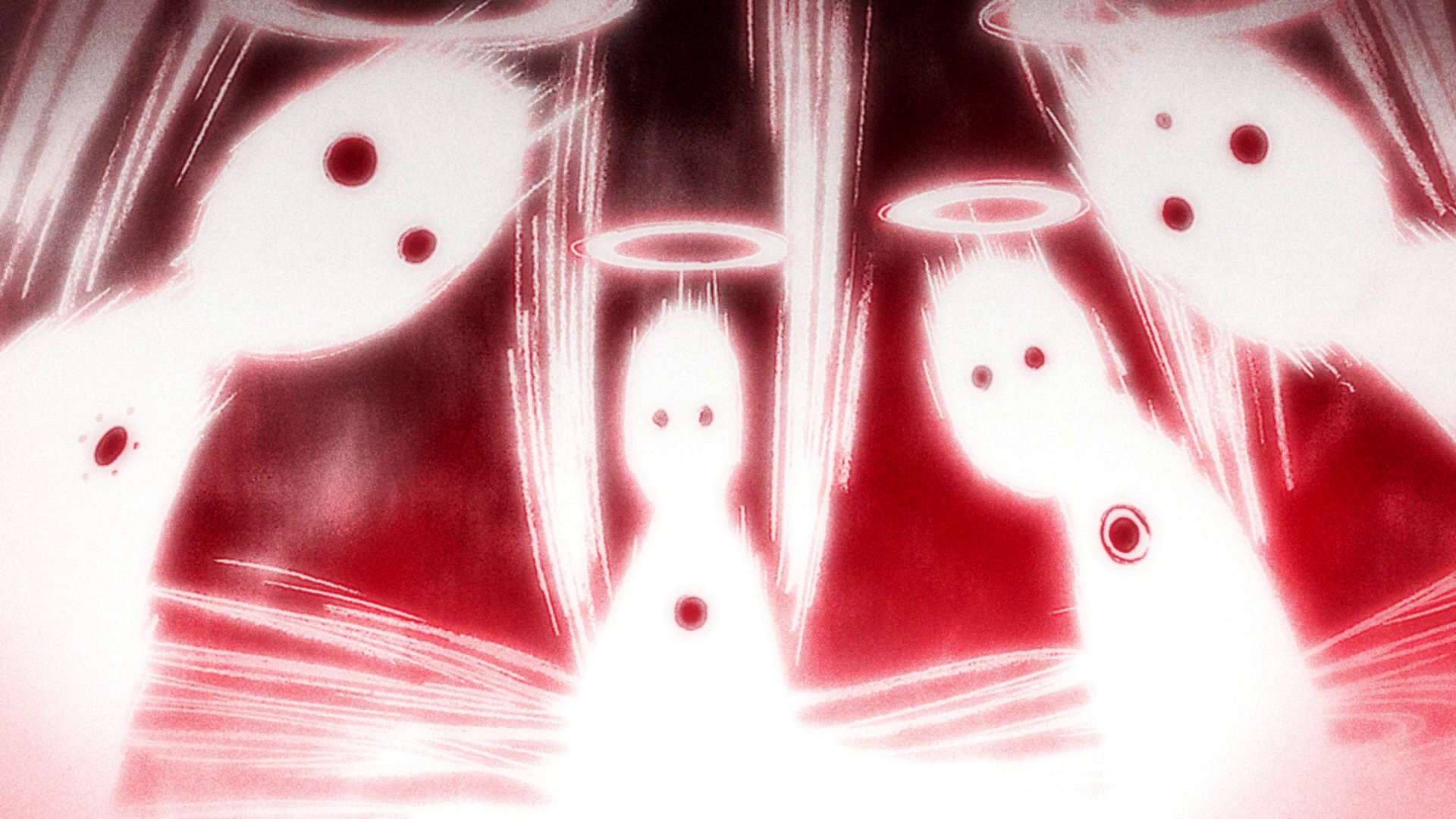

What has struck me about Rebuild from the start is how much more pronounced the mythos and scifi elements of the show are and it's not like original NGEverse was lacking in overwhelming SF settei with all the "metaphysical biology", Evas and judeochristian mumbojumbo flying around.
But with Rebuild it's been consistent approach of "more, from every single direction". It seems like every scifi settei element has been complicated and made visually more alien and arresting as principle. Just compare NGE's simple and to the point "gigantic explosion, extermination of life" 2nd Impact in ep 12 to the weirdass stuff featuring numerous Adam
s, numerous Lances (not replicas!), weird cross things and then there's the general vortex of doom that doesn't seem to disappear.
The tech and biohorrorness of Evas and related elements (Terminal Dogma for example) has been shot up.
Moon bases and moon giants (remember you couldn't even retrieve the damn Longinus's Lance from orbit in NGE)
There's unique Eva units hopping all over the place and getting pretty unceremoniously offed up to Eva-13!!!
There's more political intrigue and factions at play esp. now with Wulle and NERV that is setup utterly alien to original NGE ( even in 2.0 there's IPEA and countries being pissy about power balance as Vatican treaty shows - clear difference to NGE where UN had clear absolute control). Then there's very likely suspicion of mine about Asuka as some sort of angel-human hybrid.
They even have a goddamn battleship with Wunder a la Nadia's New Nautilus or Yamato.
I could continue this much further but whereas NGE esp. in its latter half felt like 1995 Japan quite firmly rooted in reality with few obv. scifi elements as window dressing for the storyline I can't imagine NME without all the SF elements even remotely as easily. It looks like Anno for the first time realized how fascinating the mythos of his show is and has decided to run with it.
I wouldn't even be surprised if they bring FAR in explicitly this time around (presuming origin of Moons stays the same).
Nevertheless while NME feels more focusedly like SF narrative it's not of 2001 type - it is very character driven SF narrative like NGE was to begin with. Thus we finally reach Shinji and
NME is Shinji's story
Shinji is the only main character of Rebuild and each film revolves around him and (take note!) his
actions and
development as individual. (if you've been following me up to this point you can probably get what I'm geting at with 3.0 Shinji already...)
Each film has a unique central theme realized through its main character Shinji and they're realized as thematic steps with each one following another in non-random order.For story they've been amping up the vaguely Oedipal struggle angle with Shinji, Rei and Gendo as the central trio in particular. Now with 3.0 it looks possible SEELE has been dealt with entirely and we have Gendo as the ultimate "villain" figure. Naming him "king of lilims" just makes this story structure Oedipus Rextastic to point of borderline corny in its blatancy.
They haven't been subtle about inserting Shinji/Gendo parallel nods that weren't in the original either:
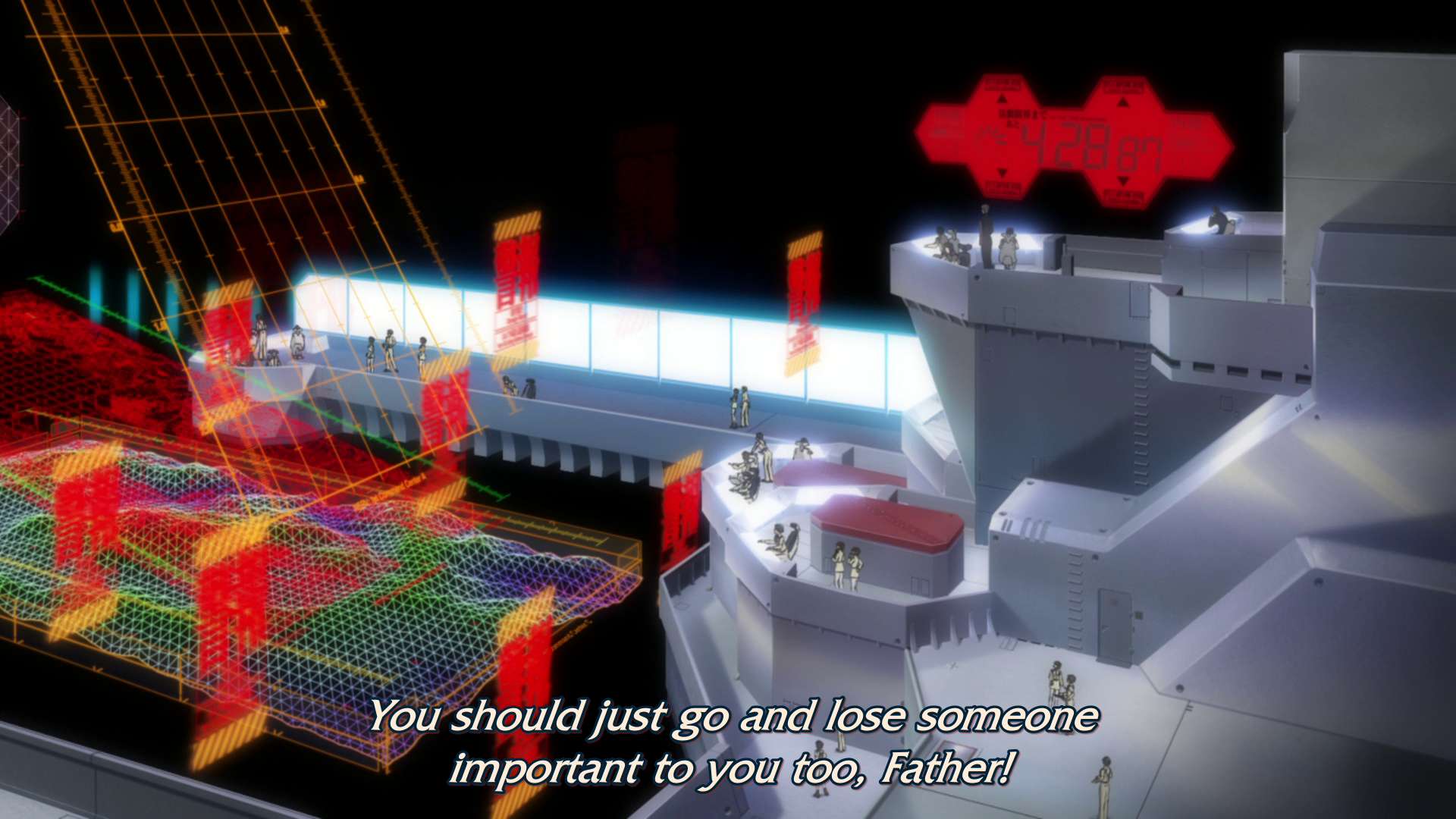 Ouch, is it wrong that I feel for Gendo here?
Ouch, is it wrong that I feel for Gendo here? NME-Shinji has a clear, developing character arc. This isn't surprising at all given the narrative focus of NME and avoidance of "Character Deconstruction" that took over NGE completely with ep 20 and in Shinji's case sabotaged his progress to lead into ever heightening levels of getting sidelined and victimised by the story. For this is NGE Shinji's place esp. towards end: constant victimising and bullying from the story developments. It's hard to find things to
blame guy for before EoE.
In any case I've argued above Shinji follows pretty common development pattern for mecha protagonists for all of first cour and even with destabilizing effect of 14-16 transition in series's style Shinji still roughly sticks to his personal "hero's journey" before everything goes to hell in ep 19. This means same holding for NME Shinji in 1.0 and 2.0 at all surprising and so I guess I could skip on following. Nevertheless let's go over them as they establish the earlier steps in Shinji's narrative in Rebuild:
Shinji: You are not alone

This is very self-explanatory, I think. Through his actions in 1.0 Shinji gains a place in the world, stands his ground, fights, faces reality and comes to find out he's not alone in the world after all. He now has a mother, friends and vague semi-love interest semi-oedipal mother figure.
Having now realized reality may not be all bad and having a place in there Shinji can start taking steps forwards: advancing further in his goals and ability to live in this world. Too bad but...
Shinji (and you others too): you can not advance



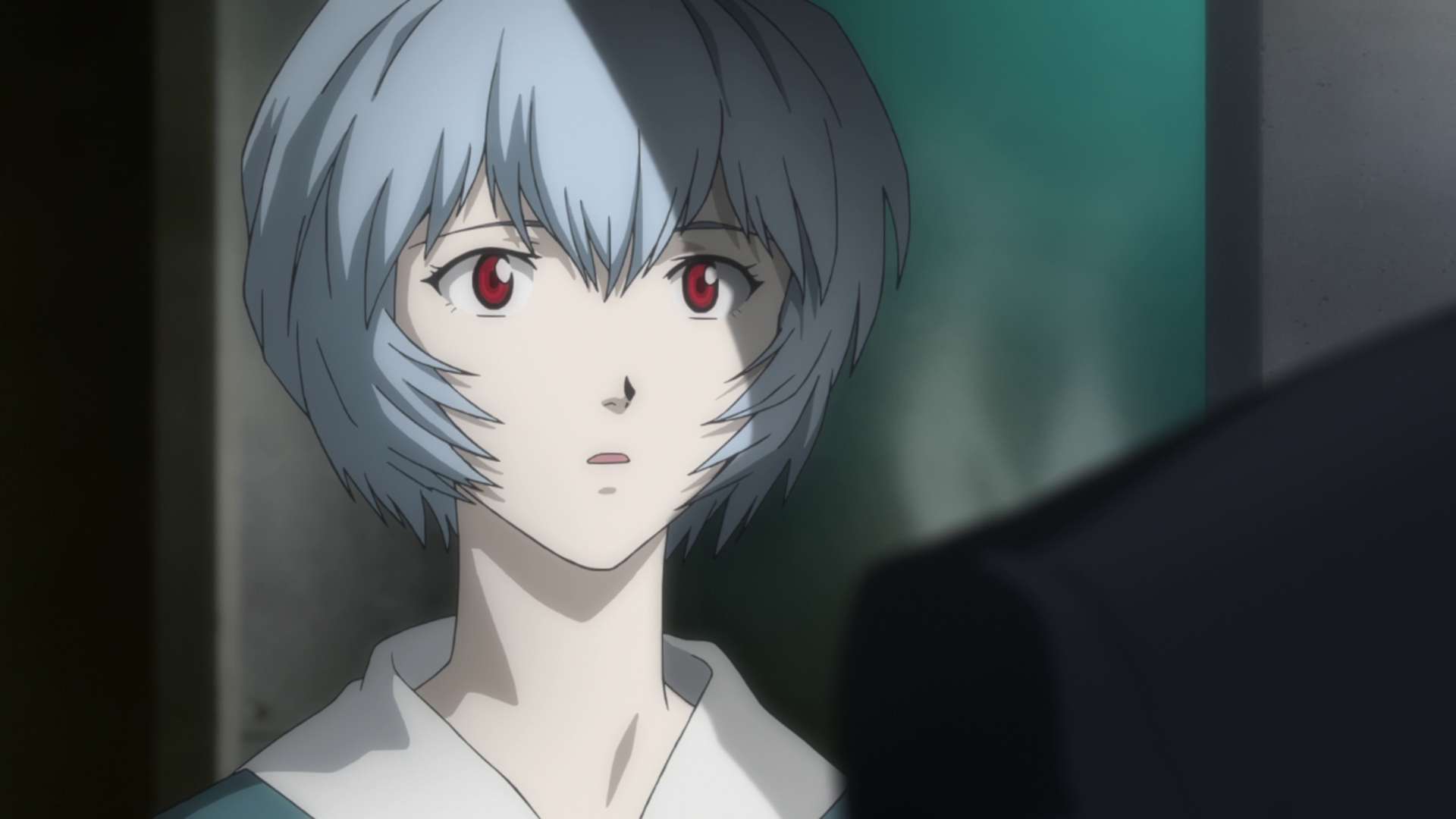
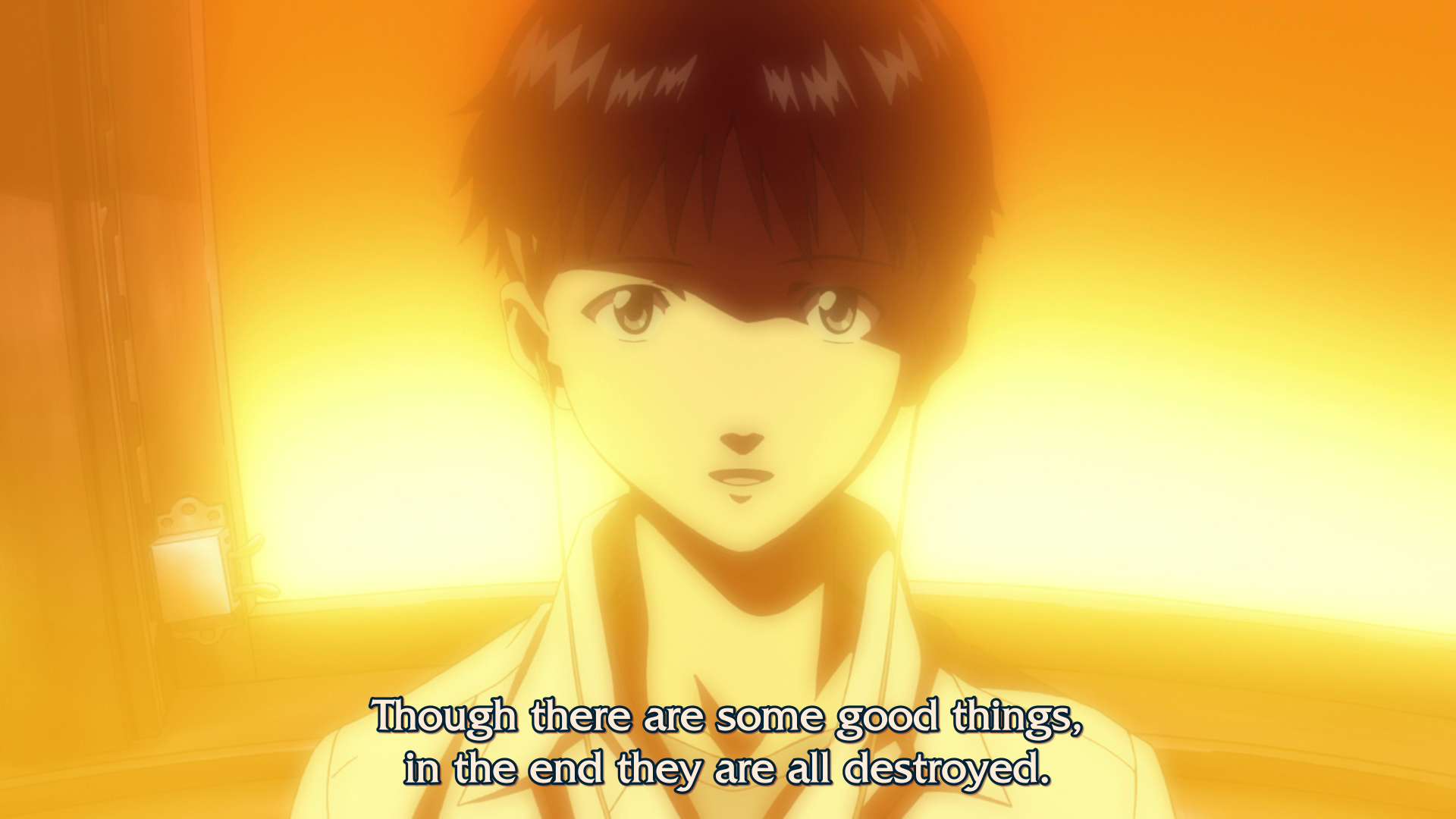
It's absolutely no coincidence 2.0 brings us into Tokyo-3 with Shinji and Gendo at Yui's grave. It sets the main ground for developing film's main theme "you can not advance": every development on this theme in film is tied either directly or indirectly to this. Rei's and Asuka's parallels arcs wouldn't exist without Shinji's attempts at "advance" and are used as echoes. (I might write more about at least one of them in some other topic later because I think it's never bene properly assessed but they're not focus here)
Having now found a livable place in the world and having started the process of opening for reality and finding some good things in it we find Shinji at exactly same place as protagonist he is in NGE in 8-19 range. Just like there he gains insight into why he pilots, tries to win his father's approval and gets emotionally betrayed beyond point of return due to Bardiel incident.
Poor guy was pretty much doomed by combination of film's name (and thus theme) and Misato saying this at the very beginning:

 it's like Donald Duck story: if things look good for him in beginning the end is bad.
it's like Donald Duck story: if things look good for him in beginning the end is bad.In the end Shinji couldn't "advance" and instead he regresses at the end of the film. Now here the first new deviation in Shinji's character arc happens:
Shinji gets to play the active part in 2.0's climax - thus at the very least breaking the cycle of "impotent passivity" before it begins, even if the consequences are horrible for him and everyone else.
I don't need to go over RoE-3I again in detail given my previous analysis but I can add this: even if Shinji entirely "accidentally" caused Third Impact in the process of saving Ayanami it still wouldn't absolve him of the crucial responsibility - Third Impact would still be consequence of his carelessness and negligence and as anyone familiar with drunk drivers running over pedestrials or other accidental causes of death they're no laughing matter and the culprit has definetly wronged nevertheless. Shinji could've metaphorically "taken a look out from Eva's window" to see shit going on outside had she not been so absorbed with Rei's blue bubble.
and now we've reached the point of divergence where Shinji's story starts to go places it never did in NGE/EoE and as NME is explicitly Shinji's journey same goes for film series as a whole. Post-EoEness hangs on one thing and one thing only: being narrative set after Third Impact initiated by Shinji with all that entails.
3.0: New chapter in Shinji's journey, new chapter in Eva
Shinji: You can not redo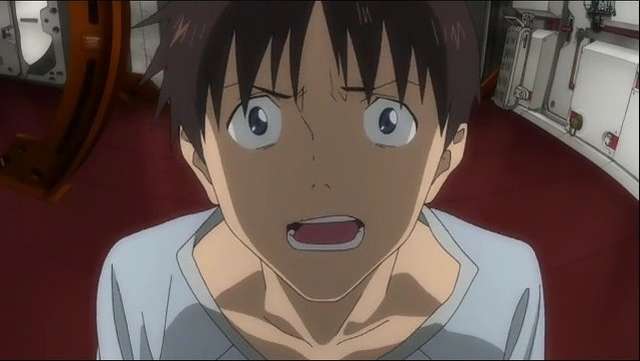
Shinji's position in the story of 3.0 is utterly unique in Eva in quite few respects. First of all the general set up in Eva can be summed up like this:
- Shinji is a victim of circumstances outside his control and the vice of adults in his life (especially: Gendo)Shinji is not universally liked character for various reasons but given his nature that is at the same time kind and quite morally upright
and cowardly and unassertive it isn't surprising being a egoistical dick to others or harming people etc. are charges that usually aren't mentioned. Closest to this kind of behaviour he comes to is during Zeruel attack but in the end he pulls through and heads for Eva-01.
(This kind of does, however, always come up in complaints about EoE Shinji. It's not only that he, uhh, does nothing. His choices end up (even if only temporarily) exterminating human race and despite everything else he has a responsibility here. Still, EoE ends before we get to see how he deals with this. His resolution towards the end and time spent setting up graves etc. on its part indicate he's ready to bear the burden and responsibility - but strictly speaking the focus is elsewhere on more meaningful themes and OMF pulls its kimochi warui quotient from elsewhere.) In short Shinji lives feeling "persecuted" and he actually is in quite few ways and as such he tends to be worthy of pity at the very least. More than anything else he's deathly afraid of everyone around him hating him though that never actually happens in the series (which doesn't mean they don't leave him emotionally unsupported now and then). It isn't a situation he never needs to deal with in NGE and as such avenue that is never really explored.
If we think about kind of responsibility that comes with pulling Third Impact it's something Shinji could possibly ever deal with in post-Eoe direct sequel as far as original NGE goes. There's nothing in original series that gives rise to comparable situation during its run and thus no room to explore this avenue of his character either.
At this point you're most likely seeing all of these coming but anyway:
3.0 systematically flips many of "key premises" in treatment of Shinji's character1. Shinji plays the part of perpetrator as direct inversion of the victim role that has been rule with him since beginning of franchise Even apathetic EoE Shinji comes off as victim at least as much as guilty party (for example when he finally musters will to get in Eva-01 and help Asuka he can't because it's been covered in bakelite etc.) to say nothing on the television series.
3.0 is the first Eva work that explores Shinji without this key premise. Quite frankly Shinji is a dork in denial who refuses to bear up the burden of his own actions for most of the film and in the end realizes he was wrong about getting unjustly ostracized by people around him. This brings us to
2. Shinji is genuinely hated by the cast Another "first time" for Shinji - 3.0 forces him to deal with realization of this deep fear of his for the first time so directly and bluntly. In NGE, not even in EoE, this is something that quite happens. At worst they leave him stranded alone in seeming world of hopelessness but he's never target of such genuine and deserved antipathy.
3. As result of general shift from character study to Shinji-centric storyline that demands him being active player no matter what due to film storytelling "rules" he avoids falling into the state of directionless freewheeler that defines him in Descend Arc and as such he's incredibly different despite the many similarities in plot elements like bonding with Kaworu Just like 1.0 and 2.0 Shinji 3.0 Shinji has a clear goal and theme given by film he must carry. Having caused massive destruction (global or local doesn't matter) through his regressive actions in previous film Shinji now needs to deal with the responsibility and owning up when reality is bitchier than he expected and the "advance" isn't as easy or clearcut as he'd hope.
Unlike Descend-Shinji who spend most of the arc as spectator and who mostly tried to hang on what he still had 3.0 Shinji has a clear goal he actively pursues, no matter how wrongheaded he is.
The moral of 3.0 is of course that you can't undo the past and your own mistakes no matter how much you regret them. The right thing to do is to take responsibility for them, grit one's teeth and move forward while trying to make amends as well as he can. There's no game over try again screens in life.
Shinji on the other hand spends most of the film in denial and desperation (realizing what he has uncogently caused earlier) over what he has done because again, he isn't a bastard. Which leads us to
4. Shinji is motivated in his actions by guilt for his big transgression and wants to atone (in the most wrongheaded way possible) This is again something NGE-Shinji doesn't end up going through to this dimension. I'm not saying he feels guilty about this and that now and then but Shinji's primary character motivation is NEVER guilt and definetly not in Descend Arc. Closest to this comes his guilt and feelings of unworthiness he got from killing Kaworu but that doesn't coincide with the time period 3.0 covers and its main effect in NGE was to push him to point of seeing no purpose in doing anything.
With RoE-Shinji it's motivation for action, not non-action. Incidentally the guilt he gets from initiating 3rd Impact is of kind he could only possibly get in original Evangelion only after End of Evangelion. Thus this part of "post-EoEness" of 3.0 is quite self explanatory. If you want Shinji dealing with burden of causing Impact - which is his crux in the film as well as its main theme - you can't do it in anything expect in nonexistent EoE sequel.
This brings us to the way Shinji fails this time around and
5. Shinji's error/failure/way to deny reality is one never really handled in original Eva and another new frontier: You can not redo is a new theme for Eva Shinji deviced numerous ways to escape from reality and fail in NGE but
he never literally tried to undo his actions and try to rewind the clock - this kind of escape from reality is new avenue studied partly because nothing in NGE's original drama gave reason for Shinji to attempt this or think it would be possible. I can't help but wonder if this has been inspired by some of Anno's own fuck ups after Evangelion like some of his new way to escape from reality following Eva were brutally dealt with in Shiki Jitsu (2000).
6. Kaworu as atoner of Shinji's sins (personal Jesus) is new setup for his characterIf I remember correctly there's line that pretty much says this about Kaworu taking up Shinji's choker. He's even more of a Personal Jesus than ever before, taking the burden of Shinji's sins and
eventually dying in his stead by the very device that was the symbolic representation of Shinji's sins.
NGE Kaworu never tried redeeming Shinji's sins because he didn't, again, have such sins as a burden. Once again post-EoEness/post Third Impactness proves very influential on new dimension that couldn't not have happened in original ep 24 take on Kaworu/Shinji dynamic.
7. Shinji ultimately breaks just like in end of Descend Arc: but reasons are subtly differentWhat breaks Shinji ultimately in NGE ep 24 is being forced to take life of being he considers more worthy than himself - a human life to make it all the worse. At the same time he kills the best, too good to be true "hope" the reality had thrown at him. If even the best of it ends up betraying him what reason is there to continue?
Kaworu's death still plays a big part in breaking Shinji but here it's guilt of more indirect nature: my own fuck ups ended up forcing Kaworu to sacrifice his life.
What breaks Shinji during the climax is that he finally comes to realize he isn't the unjustly hated victim and he's been at fault all this time. This in turn makes him do the insane, desperate emotionally blinded attempt at redoing the past. It doesn't work and Kaworu needs to sacrifice his life in Shinji's stead.
Shinji is broken by the realization he sinned, his attempt at redoing the past was futile/wrong and on top of all of this he even got Kaworu killed by his inability to come in terms with his cross to bear.
That brings me to final general difference
8. NGE Shinji was broken by gradually wearing out his emotional support pillars culminating in killing Kaworu. Rebuild-Shinji is broken by his own mistaken actions done for atonement's sake. Kaworu dying is the icing on the cake, THE final death his own fuck ups are responsible for. He can't bear the weight and just breaks down.
Conclusion:
Despite the heavy recycling of elements from Descend Arc 3.0 is marked by so many new and unpreceded story elements as well as vastly different character arc for Shinji that could only take place under post-EoE/post-3I conditions that calling this "new Eva" is justified. 1.0 and 2.0 followed Shinji's character arc up to end of 2.0 but it's here we get very different character arc for him for the first time from motivations to active role he has in story. I'm 50/50 expecting 4.0 to deviate even more for the truly new conclusion that was promised from the beginning of project
So, what about 4.0? Are we getting EoE Mk. II or not?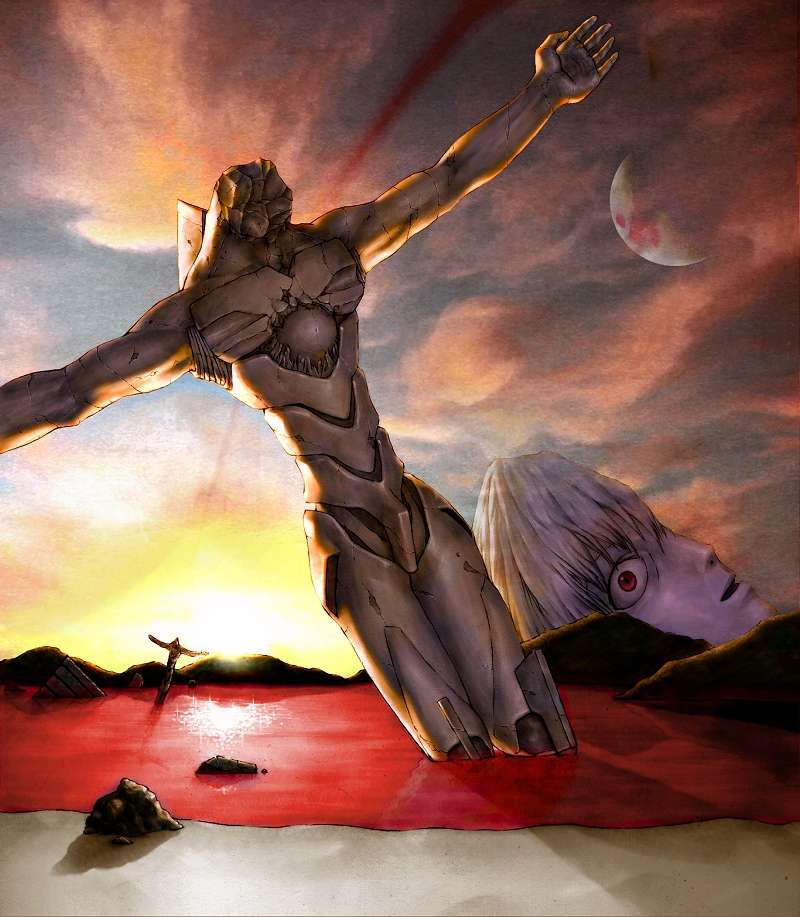
Of course I'm not sure but I have a creeping suspicion they might go down a different road in comparison to EoE to much greater degree than expected. There are quite few differences and the weird unexplained SF things make me expect something very different The best argument for EoE Mk. II is that it is the most natural way to resolve Shinji's character drama and key theme that has stayed the same regardless of whatever individual spin on it films have given. On the other hand they've ended film TWICE with aborted Impact. Are they really willing to go down that road for third time? Perhaps, perhaps not.
Some of the biggest differences that might point at very different/much more positive direction:
1. Last time Shinji was practically left alone. Sure, Misato came along to drag him around when shit hit the fan but ath that point it was really do late to achieve much in terms of psychological peop talk. But since Misato was too busy fighting her own, solitary fight against SEELE's plans she really left Shinji alone.
Now Shinji has both Asuka and Rei by her side from the start as they travel through the desert. I doub it's going to get all post-apocalyptic romcom hijinks despite this.
2. This time it really looks like it's going to be battered showdown between two fighting forces: Wille and Gendo's NERV. Misato was in hopeless position in EoE but this time around she has militant group to fight with her as well as Eva-01.
3. I suspect Adams will play some completely unexpected role at this all. In general I'm expecting the WHEE SUPER ALIENS and SF elements take more focus away from the more, uhh, metaphysical aspects of Impact resolving around Shinji's battered mental state.
4. The preview is too obscure to say anything for certain but:
Shinji Ikari continues to wander, still lacking the will to live.
He comes upon a place that teaches him hope. Finally the instrumentality project is set in motion.
To prevent Final Impact, Will-e makes one last grueling stand.
Wunder tears through the skies! Eva Units (Unit?) 8+2 sprint over the red earth!
Unless we interprept hope morbidly as "by ending everything in Final Impact I don't need to suffer anymore, yay" this would seem to hint at Shinji not being the key to Final Impact and instead he'd be among rest of Wille fighting against it. All in all the climax sounds like that of SF action film than anything.
Regardless I'm interested in seeing where they're taking this "post-EoE" tale of Shinji now. In some sense I think Rebuild can provide kind of proxy satisfaction for those who hated Shinji in EoE because here he needs to explicitly deal with what has caused many scorn EoE Shinji for years.
*************
....so if you wondered why it took this long to write reply this is pretty self-explanatory. What started as quick reply evolved into sequel/the most general analysis of NME/NGE narrative differences I've seen on this board at least since 3.0 came out. I'm not sure if post this all encompassive existed earlier either but my memory might fail me.
Anyway, I know it's long but I hope you guys like that

I also made
topic for my translation/Shinji general. Check it out too!
Xard wrote:1. 2nd Impact happens and breaks the world as we knew it and leaves it waiting for the final apocalypse/resolution to its sad post-apocalyptic state





























